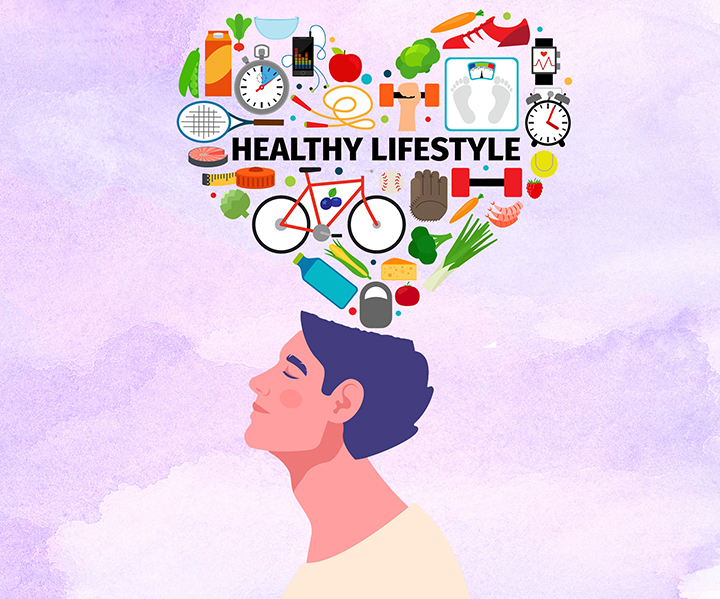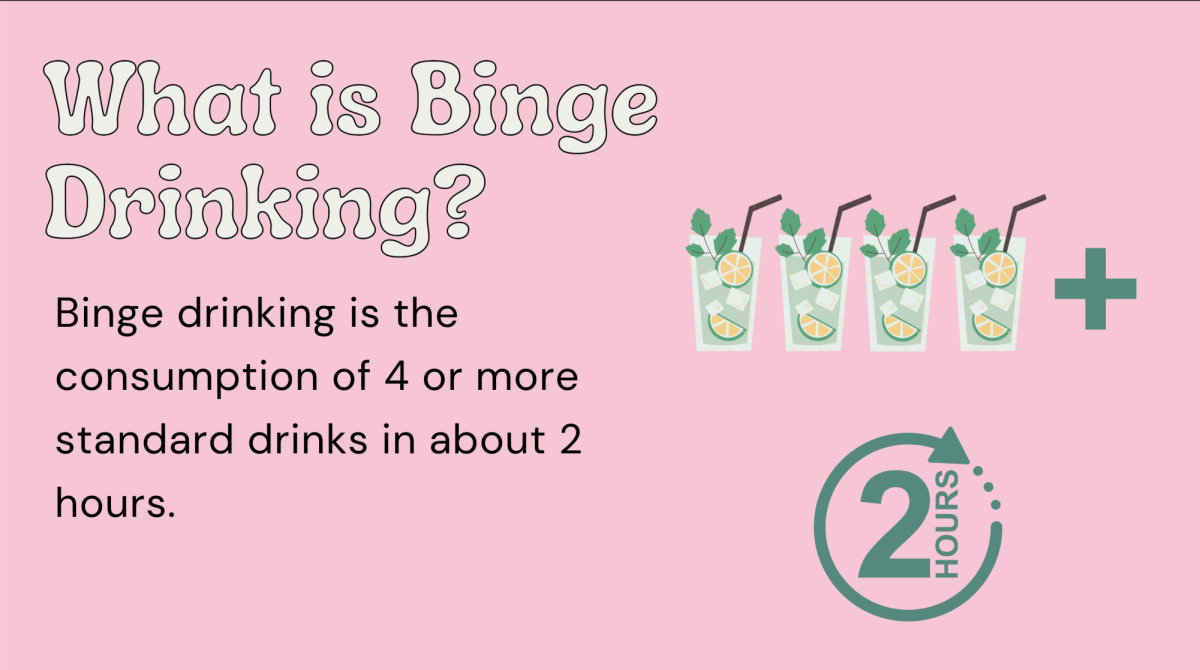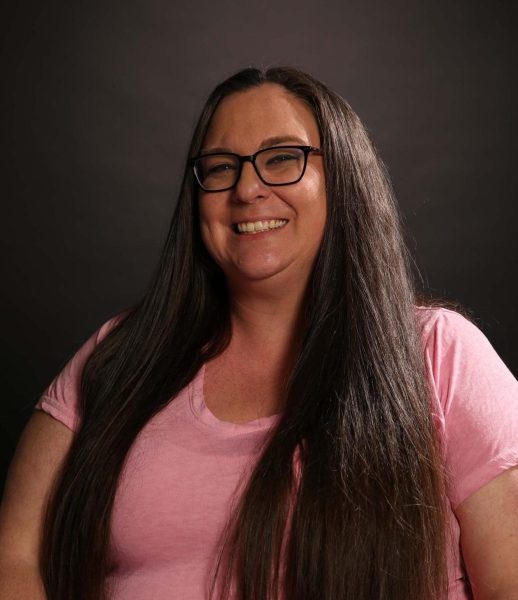About one in four college students experience consequences from their drinking such as missing class, doing poorly on exams or papers and receiving lower grades. About 13% of college students meet the criteria for alcohol use disorder, according to the National Institute on Alcohol Abuse and Alcoholism.
“After the first two drinks, I feel an almost irresistible pull to keep going,” said Rachael Farley, a child and adolescent development major.
Farley is in her first year at San Francisco State University and is a transfer student from Cañada College, where she graduated magna cum laude and currently maintains straight A’s at SFSU.
Like many college students, Farley likes to hang out with friends at a party or club where she says everyone around her is drinking.
“My drinking and drug use looks like everybody else’s in that I’m typically in a social environment when I start using,” she said.
However, the similarities in her substance use don’t last long. As Farley said, she doesn’t stop drinking.
Her friends will wrap up their night, but Farley doesn’t want the party to end.
“There usually comes a point where my friends will decide that enough is enough and they’re going home to get some rest,” she said. “For me, it often takes a full 24 hours before I feel ready to stop partying and stop using.”
Farley said she feels like her alcohol and drug use has gotten out of control and affected her personal life.
“I’ve come to the realization that I need alcohol and drug counseling after noticing that my unhealthy substance use has become more and more frequent—especially over the past two years,”Farley said.
Farley will get to a point where she feels like she has overdone it.
“One more drink or one more line would be enough to kill me,” she said.
It is estimated that about 1,519 college students aged 18-24 die from alcohol-related incidents, according to the NIAAA.
James Mone, a recent SFSU psychology graduate, describes himself as a recovered alcoholic and addict.
“As a high school student, I probably drank six or seven times but fully blacked out for about five of those times,” said Mone.
Like Farley, Mone said his drinking habits often looked like his peers’.
“My drinking often looked like the drinking of those around me, until I went home after the party to drink more by myself, or until I was bringing vodka, a toothbrush and toothpaste to work just to get through the day,” Mone said.
While in college, Mone described using acid, ecstasy, weed, cocaine and alcohol at the same time, which resulted in him being admitted to a psychiatric ward.
“This was the first in a series of turning points that would lead me to recovery and 12-step programs,” he said.
Mone was introduced to 12-step programs in his rehabilitation center, which he said made a real difference for him.
“The honest truth is that I would have been dead in a ditch, in a car, or in a hospital before age 22 if it weren’t for 12-step programs.”
Mone said that he considers himself an atheist and knows a lot of people who have avoided 12-step meetings because the literature contains the word ‘God.’
“12-step programs, in my experience, are not religious. Prayer for me is just meditation. This doesn’t disqualify me from the chance to recover from my disease.”
A 12-step meeting called Sober @ State meets on campus twice a week. SFSU’s Counseling & Psychological Services lists this meeting and other on-campus resources, as well as other resources in the community.
Farley has yet to figure out if she will seek out help for her substance use. She is doing well in school but admits to having struggled at times.
“I still have an A in all my classes, but it’s getting increasingly difficult to keep up due to my drug and alcohol use,” she said.
Work, however, can be more challenging.
“At my last job, I’d sometimes have to go straight from a night out to work on zero sleep while still somewhat under the influence. Other times, I just wouldn’t show up to work. My supervisor would call and text me, and I’d ignore those calls out of shame,” Farley said.
Farley said that her friends who don’t party as much as she does aren’t around as much anymore.
“I think some of them actually shy away from me now. As a result, I’m becoming surrounded by people that I only have superficial connections with.”
One consequence of substance use is changing relationships with family and friends,
said Natalie Macias, an SFSU graduate and current director of Health Promotion Services at the University of San Francisco.
“Other external factors like school, grades, study habits and behaviors can shift and their priorities can change,” Macias said.
Mone admits his substance use got in the way of work and school.
“I drank way too often and completely blacked out every single time,” he said. “Eventually, getting drunk before work and before lecture with at least a gram of marijuana every morning after drinking to get through the hangover.”
Mone said his substance use took him to jail multiple times and close to death twice.
Health Promotion & Wellness uses harm reduction education according to Liz Gandara, a substance use education coordinator.
“We strive to meet our students where they are in their process in a judge-free environment so that they can feel safe to come to us for support when it is needed,” she said.
CAPS offers Alcohol and Other Drug counseling services which provide a safe, non-judgmental and confidential place to talk and assess the impact alcohol and drugs have on life and get resources.
Farley has looked into their services but has reservations about seeking help.
“I feel pretty uncomfortable at the thought of putting myself out there and being vulnerable like that,” she said. “I’m sort of afraid to stop by or call to set up an appointment. I worry that I’ll be judged by the people who work there.”
Farley said that she often falls into thinking that she can just handle the issue herself.
“I mean, maybe I can—but I haven’t been able to so far.” I can go for a while without alcohol or drugs. However, when I inevitably go back to my substance use, it becomes a binge event.”
The NIAAA defines binge drinking as consuming amounts of alcohol that brings blood alcohol concentration to 0.08%—or 0.08 grams of alcohol per deciliter or more.
Farley is still figuring out what recovery from substance abuse looks like for her.
“I vacillate between believing maybe I can accomplish some sort of moderation, and believing that I need to get fully sober,” she said. “It’s difficult at age 24 having to consider giving up substances entirely. I just keep thinking that going the rest of my life without drugs and alcohol sounds like an incredibly long time.”
Farley is worried about the alcohol binges and says those are what she wants to prevent from happening.
“From a health standpoint, I don’t think my body can survive that. I worry about overdosing—especially since Fentanyl is being mixed in with other drugs,” she said.
Nearly 80% of drugs are laced with fentanyl according to Beth Mulcahy, an emergency physician at Kaiser Permanente.
“Victims who experiment with these drugs often have no tolerance built up, and tiny amounts can be deadly,” Mulcahy said.
Mone hopes to also take on a career to help others experience the transformation that he has.
“For me, there is nothing quite like seeing the light flicker on in someone’s eyes when they can finally fathom a way out,” he said.
Mone understands that everyone has a different path and what can benefit people the most is someone hearing their story.
“In my experience, help is often just listening, avoiding advice and offering empathy and understanding,” Mone said.
Mulcahy says that medication-assisted treatments, such as buprenorphine, help eliminate withdrawal symptoms.
“If a person does relapse and use fentanyl while taking buprenorphine, it will be blocked and have no effect,” Mulcahy said.
Unlike Mone, Farley said she doesn’t consider herself to be an addict.
“I’ve done just about every drug there is, but I don’t consider myself an addict because I don’t do these drugs every single day. I binge,” she said. “I want people to know that you can suffer severe negative consequences, even death, from drugs and alcohol despite not being an addict.”
She still knows the negative effects she’s experienced and hopes others can avoid that.
“The toll that drugs and alcohol have taken on my health and personal life are immense. I don’t want others to have to go through that.”
According to Macias, recovery from substance abuse starts with support and connection.
“It is important to realize that one must meet the person [seeking recovery] where they are at and not force them,” she said. “They have to be the ones to make the behavior change.”
Mone gives a message of hope to those still struggling.
“Please know that there are millions who have, quite literally, been there, done that. I made it out, and so can you.”







